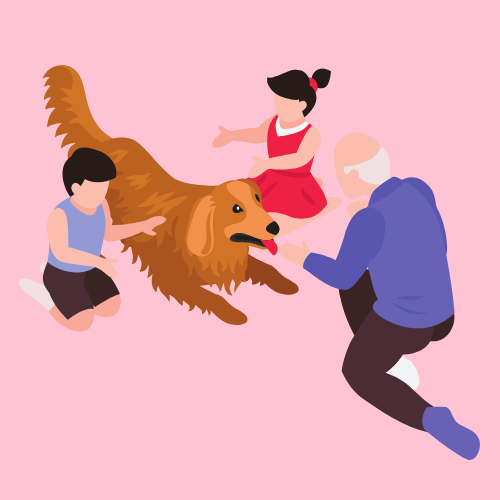No, you’re not a bad person for returning your puppy. It’s actually not as uncommon as you would believe. Many people have a change of heart after introducing a puppy into their family. Sometimes it seems like the puppy just doesn’t fit in the family dynamic but it’s usually that the owner is not responsible enough or capable enough to train and look after a dog properly. If you find yourself in this situation then it’s important to try to return your puppy to the breeder or shelter as soon as you can, so they can find a better home. While it might be upsetting to return your puppy you should be thinking about the welfare of the animal first and foremost.

Try to Rehome to a Private Owner First (Our Suggestion)
Since you were the one who took home the puppy it became your responsibility. Now you’ve decided you’re unable or don’t want to look after it anymore. It only makes sense that you should try to rehome the puppy in the best possible home you can find. Finding a private owner is ultimately the best result for your puppy, especially if you got them from a shelter. Shelters are already overcrowded and low on resources, do return it there is a negative for everyone involved.
With modern technology and social media, it shouldn’t be too difficult to find an owner with a little bit of effort. If you are not sure how to find a new home for your puppy then ask the breeder or shelter to help you out. They might be able to connect you with someone who is a good fit.
Also finding a great home for your puppy will ultimately make you feel better about your decision, knowing your puppy went to a great home will leave you with less guilt about your choice to give it away.
Don’t Wait Too Long to Return the Puppy
The longer you wait to return a puppy, the harder it will be on them emotionally. Puppies form attachments quickly and if you wait too long, they may become attached to you and your family. This will make it much more difficult for them to adjust to a new home and could cause behavioral problems down the road. It’s best to return them as soon as you realize you can’t keep them.

The longer you wait to return the puppy the worst it will be for you and the puppy. You’ll create an attachment and so will your puppy. If you wait too long they become too attached to you and your family which will make it more difficult for your puppy to adjust to a new home. This could cause behavioral problems down the road. It’s best to return them as soon as you realize that you are unable to keep them.
What to Do When You Can’t Keep Your Puppy
If you’ve decided that you want to return your puppy the best thing to do is try to rehome or return them to the breeder or shelter as soon as you can. This will ensure that the puppy has the best chance of finding a new home.
When you return the puppy be sure to explain the situation to the breeders/staff so they can find the best possible matches for their new home. Puppies need plenty of love and attention. So it’s important to make sure they go to a family who is prepared to give them the emotional support they need.
The Reality of Returning a Puppy
It’s not an easy choice to make, returning your puppy although might be heartbreaking is often the best option for people who are not going to take responsibility and train their puppy properly. Puppies are life-long commitments, members of the family. So it’s important that they go to a household where they are loved and appreciated.
Will a Breeder Take a Puppy Back?
Most legitimate breeders will have a return policy for puppies that don’t work out. However, most casual less professional breeders do not, so you will have to contact them to see what they have to say. Some breeders often require you to keep the puppy for a minimum amount of time before returning them, others might not allow returns at all.

If you bought your puppy from a pet store or shelter the chances are they will be quite flexible if you want to return them. You can always ring ahead and ask them what their policy is on returning your puppy.
Reasons to Return the Puppy to the Breeder
People often buy puppies on a spur-of-the-moment, spontaneous purchase and are totally unaware of the difficulties and long-term commitment that come with owning a dog. Here are some common reasons for returning a puppy:
Some Common Reasons for Returning a Puppy Include:
- You are not at a point in your life where you can be responsible enough to own a dog.
- Your puppy has some issues with your family (E.g. Small Children).
- You can’t afford to take care of your puppy properly.
- The puppy has a significant illness or mental issues.
- You are moving to a new area and unable to look after your dog properly.
- You have allergies, and your puppy is making you sick.
The impact of returning a pet to the shelter on future animal adoptions
When a pet is returned to the shelter, it can have a negative impact on future adoptions. Often, families who are considering adoption will hesitate if they know that the animal may be returned. This is because they don’t want to go through the process of bonding with an animal only to have them taken away again.
Additionally, returning a pet to the shelter takes up valuable resources that could be used to help other animals in need. When a pet is returned, the shelter must care for them until they are either adopted again or transferred to another facility. This can put a strain on already limited resources and may mean that other animals don’t get the care they need.
Ultimately, returning a pet to the shelter should be a last resort. If you are considering this option, please be sure to speak with a staff member first. They will be able to help you determine if returning the animal is truly in their best interest.
- Why Is My Dog Afraid of the Air Fryer? [Explained]
- Why My Dog Opening and Closing Its Mouth? [Guide]
- Why Is My Dog So Clingy When I’m Sick? [Full Guide]
How to Stop Feeling Guilty About Returning Your Puppy
- Talking to someone who understands. Sometimes it helps to talk to people about your problems. Try to find people who have had the same experience. Talk to friends, family members, or even a professional counselor.
- Remember: You are not alone. Many people return their pets, some stats show that there is roughly a 7-20% return rate for dogs adopted from shelters.
- Focus on positive aspects: While it’s natural to be upset, think about the fact that your puppy will have a better life with someone who will provide it with a nicer life. Also, you can be relieved that you don’t have to deal with the negative aspects of owning a dog, such as potty training and late-night walks in cold weather.

The Final Word
Returning a dog/puppy can be emotionally devastating. The reality is you are not a bad person for wanting to return a dog if you are not able to provide it with a loving home. If the puppy will be happier with someone else and they can provide them with the love and attention they need, then you are doing the right thing. We should suggest you make some effort to rehome your puppy first with a nice family rather than returning it to a shelter. After all, you were the one who adopted them you should take some responsibility and put some effort into rehoming them properly.

Doctor of Veterinary Medicine (D.V.M.) at Nation Taiwan University,Master of Science (M.S.) in Biomedical Engineering at National Taiwan University of Science and Technology




